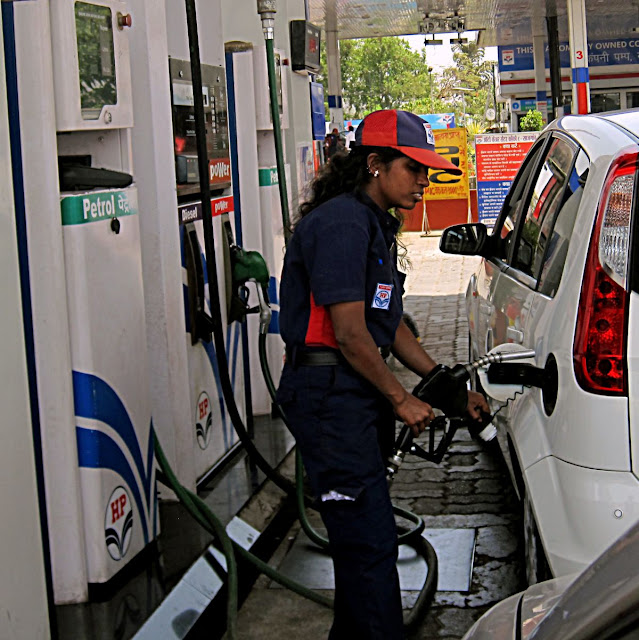

A video of a man overfilling his car's diesel tank for a social media reel has caused widespread outrage in Ajmer, Rajasthan. The footage, which has gained over 530,000 views, shows the individual engaging in unsafe behaviour and wasting fuel. Following public uproar, both the young man and the petrol pump employee have been arrested, with the vehicle confiscated under the Motor Vehicles Act.
Outrage in Ajmer Over Social Media Reel of Man Overfilling Car's Diesel Tank
A recent video of a man overfilling his car's diesel tank for a social media reel has sparked outrage in Ajmer, Rajasthan. The footage, which has gained over 530,000 views, shows the individual engaging in reckless and unsafe behavior, wasting fuel and risking damage to his vehicle.
Background
Social media reels have become increasingly popular in India, with creators often seeking attention and views through extreme or risky stunts. In this case, the young man's actions not only posed a safety hazard but also raised concerns about fuel wastage.
Arrests and Investigation
Following public outcry, both the young man and the petrol pump employee who allowed him to overfill his tank have been arrested. The vehicle involved has also been confiscated under the Motor Vehicles Act. The police are now investigating the incident and considering charges of reckless driving and fuel misuse.
Top 5 FAQs and Answers
Q1: Why is overfilling a car's diesel tank dangerous?
A: Overfilling a tank can cause fuel to leak out, creating a fire hazard. It can also damage the vehicle's engine and fuel system.
Q2: What are the consequences of fuel misuse in India?
A: Fuel misuse, including overfilling or storing fuel improperly, can attract fines or imprisonment under the Motor Vehicles Act and Petroleum Regulations.
Q3: How can social media stunts impact public safety?
A: Reckless stunts performed for social media views can promote dangerous behavior and pose risks to both the performers and the public.
Q4: What is the role of social media platforms in preventing such incidents?
A: Social media platforms have a responsibility to flag or remove content that promotes unsafe or illegal behavior.
Q5: How can reckless driving be deterred?
A: Strict law enforcement, public awareness campaigns, and responsible driving education can help reduce reckless driving incidents.
Conclusion
The incident in Ajmer highlights the need for responsible social media behavior and the importance of adhering to traffic and fuel regulations. By raising awareness about the risks associated with overfilling fuel tanks and promoting safe driving practices, we can prevent similar incidents and ensure the safety of our communities.

In an effort to improve vision care in rural India, the Bhaktivedanta Hospital & Research Institute held a Mega Eye & Dental Camp in Barsana, Uttar Pradesh. Equipped with state-of-the-art technology, the hospital aims to perform over 5000 PHACO procedures, free of cost, for those in need. The support of Tata Capital Ltd. enabled the camp to expand its reach to over 50,000 beneficiaries and receive the support of esteemed dignitaries including Smt. Hema Malini Ji and Smt. Nupur Desai.

Indian society has a narrow and sexist definition of parvarish, praising daughters who conform to traditional gender roles and blaming parents if they don't. However, it's time to focus on dismantling patriarchy within the household and raise a feminist generation. This means providing equal education to both daughters and sons, encouraging critical thinking and questioning societal norms. Parvarish should not mean curbing basic legal rights but rather empowering individuals to make their own decisions and think for themselves.

India's festival of lights, Deepawali, has been officially recognized by UNESCO as an intangible cultural heritage of humanity. The inscription acknowledges the festival's cultural significance and its ability to bring communities together. Prime Minister Narendra Modi welcomed the announcement, stating that Deepawali holds a special place in India's culture and represents values such as hope and righteousness. This recognition is expected to increase the festival's global popularity even further.

During Prime Minister Narendra Modi's recent visit to Tokyo, the city welcomed him with the soulful chanting of the Gayatri Mantra, one of the most sacred and powerful verses in Indian spiritual tradition. This ancient mantra, found in the Rig Veda, is believed to have a mental healing effect due to its repetitive and focused chanting. Research has also shown that it can improve well-being and provide a sense of peace and connection for both religious and non-religious individuals.

The M3M Foundation unveils 'Payal@40' campaign to commemorate Dr. Payal Kanodia's 40th birthday on December 9, 2025. This campaign, which aims for comprehensive impact across education, healthcare, skill development, and women's empowerment, reflects a leadership approach rooted in service and compassion. With the vision of Dr. Kanodia, the campaign marks a pivotal moment for the Foundation's ongoing mission of equitable development in India.

In a unique move to promote tourism, Madhya Pradesh Chief Minister Mohan Yadav has planned to hold cabinet meetings at famous heritage sites in the state. The latest meeting will take place at Khajuraho Convention Centre, known for its architectural wonders. The two-day visit will also include a jungle safari in Panna Tiger Reserve and review meetings of various departments, highlighting the state's vast natural and cultural beauty.

The main accused and owners of the Goa nightclub where a massive fire killed 25 people have fled to Phuket, according to Goa Police. The police have coordinated with Interpol to apprehend the accused as a Look Out Circular was issued against them. Meanwhile, an employee of the club has been arrested and the postmortem on all 25 deceased has been completed.

Experience a global perspective with the launch of "October 20, 2025e-Paper". Get your daily dose of news and reviews from cinema and streaming in "First Day First Show". Stay updated on the top 5 technology stories with "Today's Cache" and simplify science with "Science For All". Decode the headlines with hard facts in "Data Point" and learn to prioritize your health in "Health Matters". Stay updated on the literary world with "The Hindu On Books". All in one place!

The state of Maharashtra in India has set a new world record for installing the most number of solar agriculture pumps within a single month. The initiative, called 'Magel Tyala Saur Krushipump', saw the installation of 45,911 pumps, which was officially recognized by the Guinness World Records. The achievement was celebrated in a ceremony attended by Chief Minister Devendra Fadnavis.

Explore the historic and stunning Hyderabad House, located at 1, Ashok Road in Delhi near India Gate. Built in the 1920s for the last Nizam of Hyderabad, it boasts 36 rooms with grand stairways, unique European-Mughal style decor and striking marble patterns. After its government takeover in 1974, it has served as a prestigious venue for hosting foreign leaders, state banquets and VVIP meetings, with notable guests including Bill Clinton, Gordon Brown and George W. Bush. Take a virtual tour of this architectural gem and its rich history.